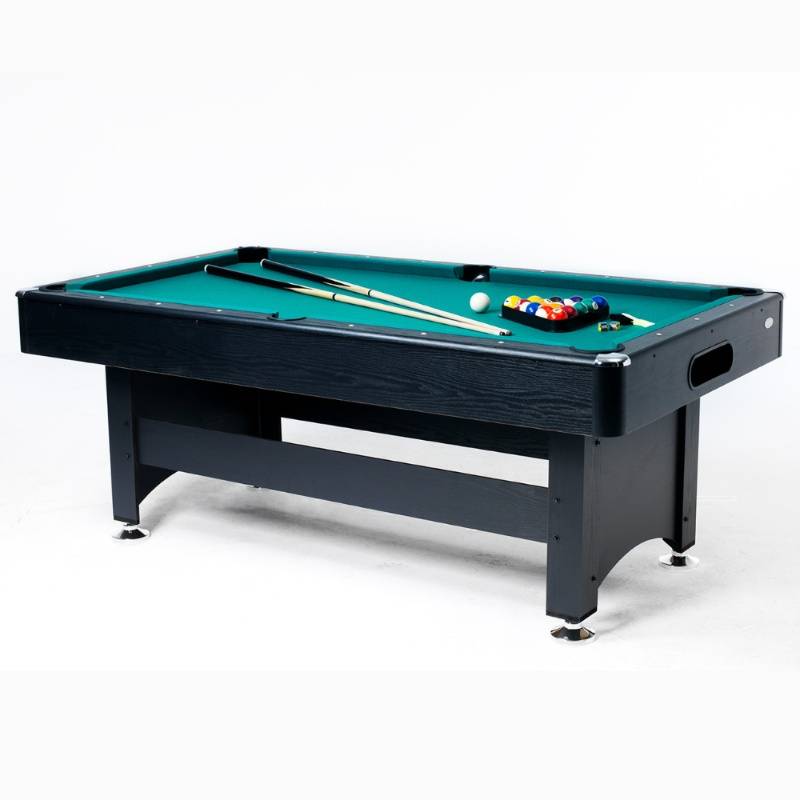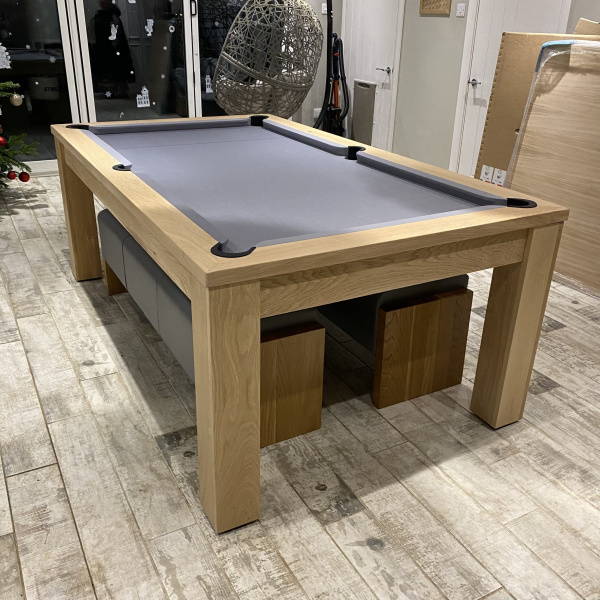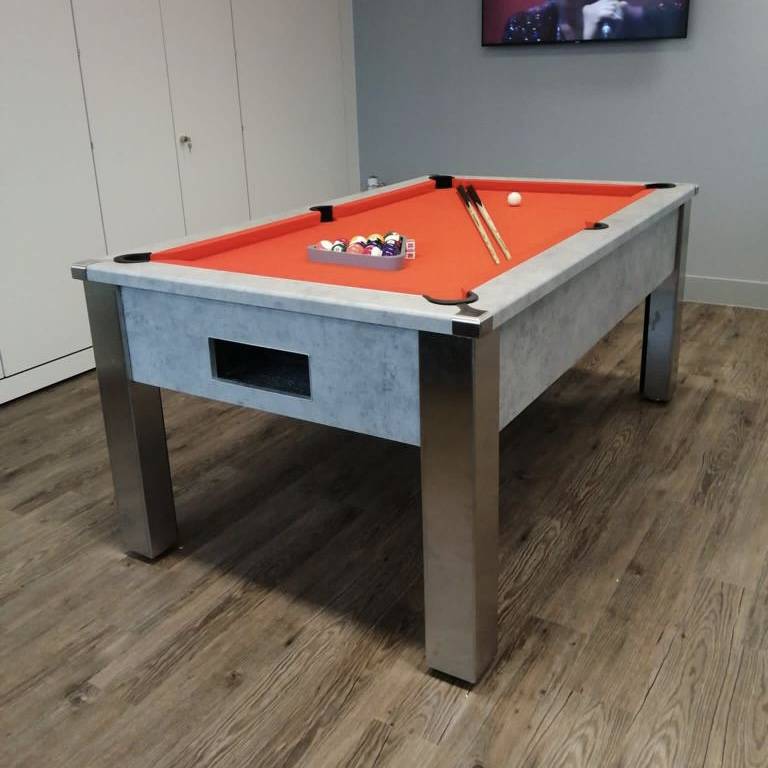The Eco-friendly Trend: Sustainable Pool Tables in the UK

In today’s ever-evolving world, sustainability is not just a buzzword but a lifestyle choice for many. This drive towards sustainability has permeated various industries and product categories. One such unexpected area where the eco-friendly trend has left its mark is the world of pool tables. In the UK, there has been a significant surge in the demand for sustainable pool tables. These tables not only embody the sport’s tradition and elegance but also reflect a commitment to reducing one’s carbon footprint.
A Glimpse into the Traditional Pool Table Manufacturing Process
To fully appreciate the importance of sustainable pool tables, it’s essential to understand the traditional manufacturing processes. Historically, pool tables have been built using a variety of materials, including hardwoods, slate, and synthetic materials for the cloth. The extraction and processing of these materials have significant environmental implications. For instance, the mining of slate leads to habitat destruction and soil erosion. Meanwhile, the use of hardwoods contributes to deforestation.
Why the Shift Towards Sustainable Pool Tables?
- Growing Consumer Awareness: More than ever before, consumers are making buying decisions based on the ecological impact of their purchases. As the awareness about climate change, deforestation, and environmental degradation increases, many pool enthusiasts in the UK are looking for greener alternatives.
- Innovation in Materials: Recent advances in sustainable materials have made it feasible to produce pool tables with reduced environmental impact. From recycled materials to eco-friendly finishes, manufacturers now have a plethora of green options to choose from.
- Regulations and Incentives: Governments and organizations are recognizing the need for sustainable production. The UK, being at the forefront of many eco-friendly initiatives, has laid out guidelines and even incentives for companies adopting sustainable practices.
Features of Sustainable Pool Tables
- Eco-friendly Woods:Instead of using hardwoods sourced from endangered forests, sustainable pool tables employ recycled wood or wood from certified sustainable forests. The Forest Stewardship Council (FSC) certification is one such hallmark of sustainably harvested wood.
- Alternative to Slate: Innovations have introduced materials like recycled resin or compressed particle board as alternatives to slate. Though they may not provide the exact same play experience as slate, they come remarkably close and are far more eco-friendly.
- Green Cloth Options: The cloth is a crucial part of a pool table. Sustainable variants use cloth made from organic or recycled materials, reducing the carbon footprint associated with its production.
- Eco-friendly Finishes: Instead of toxic finishes, which release volatile organic compounds (VOCs) into the atmosphere, sustainable pool tables employ water-based finishes and glues.
The UK Market Response
The response from the UK market towards sustainable pool tables has been overwhelmingly positive. Not only are consumers more inclined to purchase eco-friendly tables, but businesses such as pubs, clubs, and recreational centres are also making the switch. This is a testament to both the quality of these tables and the evolving consciousness of the UK populace.
Furthermore, UK-based pool table manufacturers are rising to the occasion. Recognizing the demand, many have expanded their product lines to include sustainable options. Some have even dedicated their entire production process to eco-friendly practices, setting a benchmark for others in the industry.
Benefits Beyond the Environment
While the primary drive for sustainable pool tables is undoubtedly the environment, the benefits extend beyond just ecological impact.
- Durability: Sustainable materials, especially when it comes to wood and finishes, are often more robust and long-lasting.
- Health Benefits: With reduced VOC emissions from finishes and glues, users are exposed to fewer chemicals, promoting better indoor air quality.
- Economic Advantages: As the demand for sustainable products grows, businesses that adopt these practices often find themselves at a competitive advantage. This can translate to better market positioning and, ultimately, increased sales.

The Environmental Cost of Traditional Pool Tables
To further our understanding of the environmental implications of traditional pool tables, we need to focus on their lifecycle. From sourcing raw materials to manufacturing, transportation, and end-of-life disposal, each stage has distinct environmental impacts. For instance:
- Transportation: Heavy materials like slate, often imported from distant regions, increase the carbon footprint due to transportation.
- Disposal: Non-biodegradable components, particularly synthetic cloths and certain finishes, take years to decompose in landfills.
Reclaimed Materials and Craftsmanship
One significant trend in the sustainable pool table market is the utilization of reclaimed wood. Reclaimed wood, sourced from old barns, warehouses, and even discarded furniture, offers a rich history and a unique aesthetic.
- Aesthetic Appeal: Each reclaimed wood piece has its own story, providing an unmatched, rustic look that's becoming increasingly popular among homeowners and businesses in the UK.
- Reduced Waste: Using reclaimed materials drastically reduces waste in landfills.
Supporting Local Artisans and Businesses
The shift toward sustainability often goes hand-in-hand with supporting local businesses. By sourcing materials locally and employing regional craftsmen, pool table manufacturers can:
- Boost the Local Economy: Encouraging local craftsmanship helps in job creation and fosters community growth.
- Reduce Carbon Footprint: Local sourcing cuts down on transportation emissions.
Consumer Education and Workshops
A pivotal factor in driving the sustainable pool table trend is consumer education. Several manufacturers and retailers are now:
- Hosting Workshops: These events educate consumers on the benefits of sustainable pool tables, from their environmental impact to their durability.
- Offering Customizations: To cater to the environmentally-conscious consumer, many manufacturers now offer bespoke designs using sustainable materials, allowing customers to have a hand in creating a table that aligns with both their aesthetic preferences and environmental values.
The Future: Innovations on the Horizon
As technology and materials science advance, the future holds even more promise for sustainable pool tables.
- Bio-based Resins: Scientists are developing eco-friendly resins derived from plant sources. These could serve as alternatives to petroleum-based resins currently used in certain table components.
- Upcycling: The concept of transforming old or discarded pool tables into new, usable products is gaining traction. This not only saves resources but also sparks creativity in design.
- Digital Platforms: Augmented reality (AR) and virtual reality (VR) can potentially offer 'try before you buy' experiences. Customers can visualize how a sustainable pool table would look in their space, further reducing the chances of returns and wastage.

Conclusion
The rise of sustainable pool tables in the UK is a shining example of how traditional industries can evolve to meet contemporary challenges. As we navigate the complexities of the 21st century, such innovations remind us that sustainability and tradition can, indeed, go hand in hand. The future of pool tables in the UK looks green, and it's a trend that is set to inspire industries worldwide.
Are you looking for a Pool Table? check out our pool tables range Pool Tables





